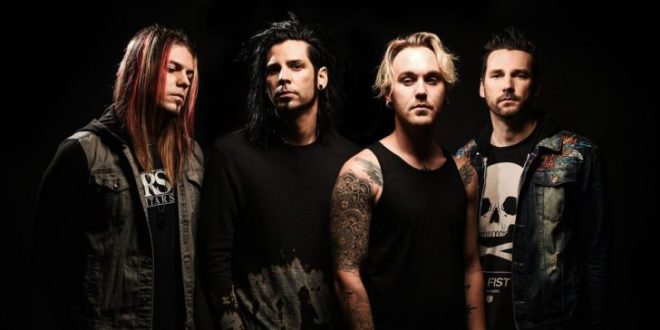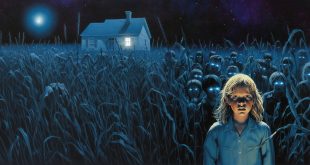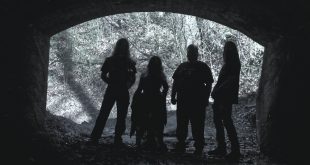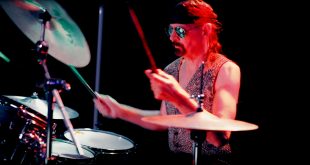Auckland, New Zealand’s Like A Storm have a sonic identity right on par with their band name. Formed in 2005 by the Brooks brothers (Chris, Matt, and Kent), their melding of heavy alternative, crisp electronica and indigenous textures took several years to solidify. But following their 2009 debut, The End of the Beginning, the band would go on to establish a justifiably thunderous rapport overseas, opening for veteran American acts such as Puddle of Mudd and Skillet. A consistent, assiduous touring run boosted Like A Storm’s 2015 sophomore album, Awaken the Fire, to similar success, with additional dates covering much of Europe.
Now, Like A Storm have returned with Catacombs, their most thematically and stylistically involved album to date, on which newest member Zach Wood shines. I caught up with front man Chris Brooks to discuss their current happenings, the musical climate of New Zealand, as well as how Catacombs wholly contributed to the band’s musical growth thus far.
ME: At the moment, what are you guys up to?
Chris: We just finished the album, and went straight into playing festivals. We did Rock on the Range, Rocklahoma, and another couple. Now, we’re getting ready for Rock USA, which I think is in about 10 days or something. Matt and I are hanging out in Vegas, Zach’s in LA, Kent’s in Toronto, and we’re just getting ready for the touring part of the record to begin.
ME: That’s cool! In what ways do you feel touring offers a different experience to recording?
Chris: Obviously, we love the music that we get to play every night. I think when you make an album, it’s very introspective, you know? You separate yourself from everything, and you work over and over to make sure the music is good, and the lyrics resonate.
Playing live, in contrast, is very immediate. Every one is right there, and you get a certain energy from playing those songs live. In a sense, it’s easier than making a record; it’s much more instant.
ME: I guess what matters, through and through, is you’re constantly surrounded by music, one way or the other.
Chris: Yeah, exactly. When you’re making music, you have to push yourself, whereas when it’s live, you’re caught up in the moment. For us, that live energy is really important. We worked it out to really bring that onto the album.
ME: I appreciate how you guys are from New Zealand, and I’m familiar with several Auckland bands myself. Obviously, the classics, like Split Enz, Th’ Dudes, Garageland and Tadpole. What are your feelings about the scene there?
Chris: That’s an interesting question. I think New Zealand has had a lot of talented bands and musicians, and I’m very impressed with your knowledge of our local music. The tough thing is always translating that into a touring band. New Zealand is so small and isolated that you can’t play every night of the year, the way you can in the US and Europe. It may have great songwriters, but it’s really hard to develop that. I don’t think the longevity is as much as it is in other parts of the world.
ME: Yeah, I think it’s more common for bands to achieve greater popularity somewhere else. Similarly, you guys have had crossover success here in the US. That says a lot, given that the prevalence of modern rock here still hasn’t been what it used to be. Do you feel there was some luck involved in terms of how your sound resonated here?
Chris: I’m not sure, but I think a huge turning point in striving for that success came from wanting to be ourselves — figuring out what that meant, and pushing that identity musically. I remember having meetings with record labels and management companies around the time we’d finished our first album. They’d be saying “You guys don’t really sound like anyone else, so we don’t quite know what to do with you. Go and listen to the top five bands in active rock, and try and sound like them.” For us, it was just so absurd that, growing up on the other side of the world, we would now attempt to sound like bands from the US. It really gave us the drive to say “You know what? We’re not even going to entertain that idea; let’s just push further what makes us different, and have that freedom to be ourselves.”
It was interesting how we integrated that. In “Love the Way You Hate Me,” we brought in a didgireedoo, and all of a sudden, we had success with that. Those same guys were now saying how amazing our sound was, you know what I mean? It started out as a problem, but once we had success with it, they’re commending us for it. So, that was an interesting double standard. I was always glad that we made the decision not to sound like anyone else. The best chance you have at creating something memorable is when you’re yourself. Nobody is as good at being you as you are. To contrast it, you’re never going to sound like another band as much as they do, so why simply model that to chase some success? For us, it was really important that we believed in what we were doing, and were able to express ourselves artistically. We were just lucky that that was something a lot of rock fans were wanting to hear, you know? One of the best things about it is that we’re on the fringes of society, and we like to be challenged and pushed, and don’t want to hear the same generic sound over and over. That’s what pop fans would be into; rock fans want something special.
ME: Take me back a bit. When it came to your younger days, what was your musical environment like?
Chris: My very early memories were of the stuff our parents listened to. We listened to the Beatles a lot, and our dad was really into the Eagles. For our idea of harmonies and harmonizing, we were really inspired by that.
Once I started getting into music for myself, I was hugely into Nirvana, as a ton of people were, hearing Kurt Cobain, his voice and his songs. By the time I had gotten into them, he had already passed away. I just remember being really hit by that, how someone with so much talent couldn’t find a place for himself. Then, when playing guitar, I got really into Jimi Hendrix. His guitar playing is a huge inspiration on me to this day, how he was able to think outside the box musically. I also got really into bands like Metallica, but also Nine Inch Nails and Marilyn Manson — a lot of bands that use sonic textures to express the emotions within their music. I think early on, we were inspired by big heavy bands, but also the integration of layers of programming within the music to paint a picture, while the vocals are on top.
ME: That accumulation of influences — from the metal guitars, to the alternative chords, to the electronica — leads all the way to your latest album, Catacombs, which is a whole other story in itself. Can you tell me a bit about the process?
Chris: That was an intense process, man. Before that, we were still getting off at these amazing tours. We’d be trying to work on the album, and yet we’d play Europe with Alter Bridge and Gojira, or New Zealand and Australia. We’re touring as much as we want, but internationally.
So, we really had to take time off after those tours and dedicate ourselves to finishing this album. We knew we wanted to go deeper on this record than we had previously, musically and lyrically. The idea came when we went to Paris to the catacombs — just such a haunting site, you know? Millions and millions of skeletons buried a couple hundred feet beneath the surface of Paris. To us, that was a really powerful metaphor. What we found was that we removed ourselves from the distractions of touring. On the surface, everything is fine and great, but as you dig deeper, you find everything that you’d tried to bury inside yourself — all these things you didn’t want to address; all these things you didn’t want to face. You realize that none of that has gone away; it just keeps building up. When you have those things to address, it can get pretty overwhelming. It was a strong metaphor for how we were feeling after touring the last few years.
At that point, we thought it would make such a great concept for the album. You can’t scratch the surface; you have to go fully into this concept and the lyrics, and be honest with yourself.
ME: It’s something I can definitely relate to as well. Which songs do you feel really kickstart that main thematic tone for the album?
Chris: The song “Catacombs” is one, from the Paris trip. Thematically, it’s about having catacombs within yourself, its buildup of all your past regrets, and not being able to escape them. “The Devil Inside” is about battling demons. In modern society, especially, we’re really good at distracting ourselves from how we’re feeling. For a lot of people, it’s consuming media, being on social media, or just occupying yourself every moment of the day, so you’re never alone with your own thoughts. But then there’s nighttime and early morning. For me, a lot of the lyrics came to me around six in the morning. The times that you try to go to sleep, you’re trying to remove the noise of the day until all you can hear is this voice in your head — and you have to listen to it.
ME: For fleshing out the extent of those themes, you produced the album yourself, right?
Chris: Yeah, we did.
ME: Did you feel like you were able to get as much of that big sound, by going that route?
Chris: I think so, man. When you’d asked me about my influences before and I was listing them off, it’s amazing how when you combine them, you can really see why we’re drawn to the sound that we are. We’ve always wanted to make music that has that primal foundation, but at the same time, a lot of depth to it. That way, you’ll listen to it 10 times over, and each time, you’ll find something else in it. It was really important for us not to make it one-dimensional. We had a clear vision and knew what we wanted to achieve sonically. At first, we worked with other producers just to try it out. I think few bands want to put in the work involved in producing their own albums. It’s a ton of work. Not only are you doing the writing for the album, you’re also doing this other job. So, it means you never sleep for the whole duration of the album. You have to be honest enough with yourself to say “Do I like this part because I took my time with it, or because it was immediate?” or, “Maybe the verses still need work; maybe the chorus still needs work; maybe the lyrics aren’t strong enough.” We really pushed ourselves to get the songs to the level they needed to be at. Ultimately, we produced the album ourselves, because we relealized that in order to complete that vision, we needed to work harder than anyone else, since we would be the most appreciative of that vision.
ME: Overall, what did you end up learning about yourselves, not only as musicians, but as people, during the making of the album?
Chris: We definitely grew closer musically, and had a much greater appreciation for what everyone is bringing into the collective sound of Like A Storm.
Kent, Matt and I are always writing — either just little ideas, or full demos. All of us write ideas that are on every point along that sort of gradient. I was blown away by the quality of songs that Kent and Matt were working through. And I was really surprised when finding out they were going through the same things I was. If you look at the content from each writer, it could have very well been written by the same person. It’s interesting how it comes together even though Kent’s in Toronto with a family, and Matt and I are in Vegas.
I was also impressed with how everyone’s playing on the record really moves up the level. Zach absolutely destroyed the drums on this record; he did an incredible job. When we recorded it, he really didn’t have enough time to learn these songs, or to actually lay down the tracks for them. But I think there was one day where he smashed out maybe six songs. And the drums on this record are incredibly complicated. Kent and Matt grew up playing drums first. I’d never played drums. I was always inspired by them, but what I’d write would be basically impossible to play because I’m never thinking about the fact that a drummer only has two arms, you know? If I think it sounds best for a drummer with eight arms, I normally wouldn’t write something out of ignorance. But not only was Zach able to play them, he was also able to integrate his own metal drumming influences. It was cool to be able to listen to everything and have it all come together.
ME: Lastly, anything you’d like to say to the fans?
Chris: I always want to thank our fans. We have absolutely incredible fans, you know? They’ve given us the freedom — through their incredible support — to push ourselves musically and follow our vision further and further. We don’t have to worry now about what’s successful, because we know we have an incredible group of fans that really connect with what we’re doing artistically, especially on this record. I’m incredibly grateful that they support us the way they do, and how they grow with us as we try things we’ve never done before. So yeah, I just want to thank them!
Like A Storm Socials:
Facebook|Official Website|Twitter|Instagram|YouTube
“The Devil Inside” Music Video:
 Music Existence Because of Music, We Exist
Music Existence Because of Music, We Exist




